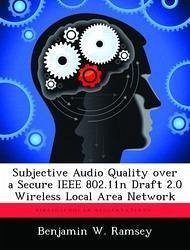This thesis investigates the quality of audio generated by a G.711 codec and transmission over an IEEE 802.11n draft 2.0 wireless local are network (WLAN). Decline in audio quality due to additional calls or by securing the WLAN with Internet Protocol Security (IPsec) is quantified. Audio quality over an IEEE 802.11n draft 2.0 WLAN is also compared to that of IEEE 802.11b and IEEE 802.11g WLANs under the same conditions. Audio quality is evaluated as Mean Opinion Score (MOS), calculated as the average subjective audio quality score given for each WLAN configuration. Results suggest that audio quality over an IEEE 802.11n draft 2.0 WLAN is not higher than over an IEEE 802.11b WLAN when up to 10 simultaneous G.711 calls occur. A linear regression of the subjective scores also suggest that an IEEE 802.11n draft 2.0 WLAN can sustain an MOS greater than 3.0 (fair quality) for up to 75 simultaneous G.711 calls secured with WPA2, or up to 40 calls secured with both WPA2 and transport mode IPsec. The data strongly suggest that toll quality audio (MOS gt; 4.0) is not practical over WPA2-secured IEEE 802.11 WLANs.








